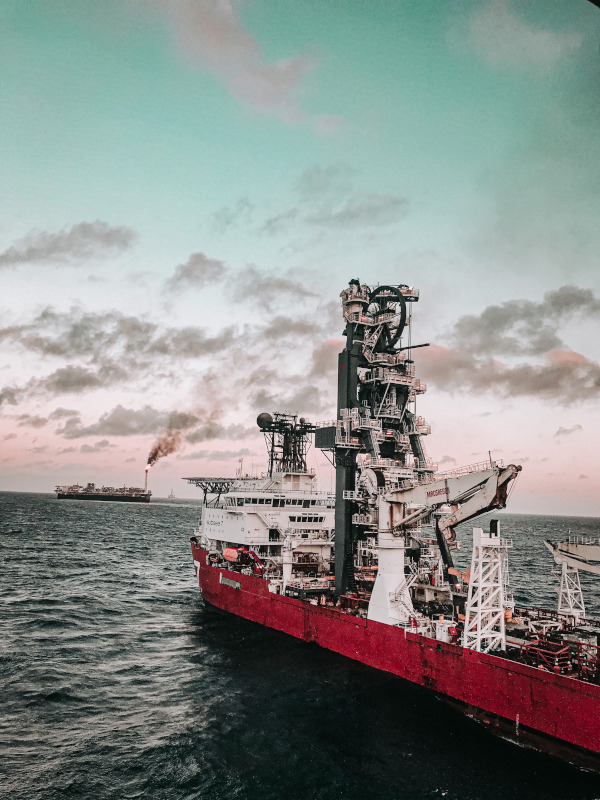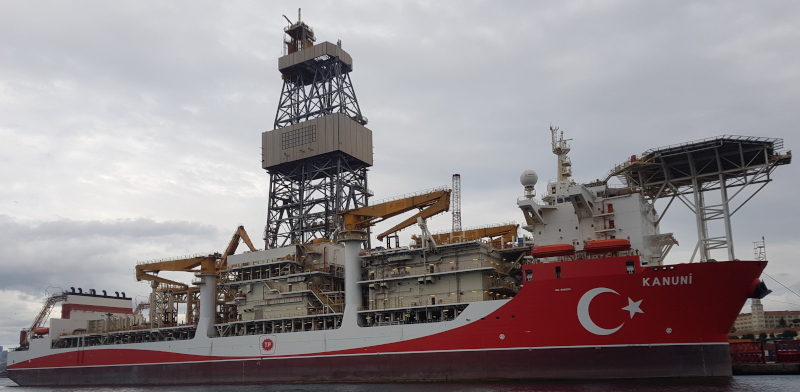
A drillship in the sea. Resource: Unsplash.
Amidst an international crisis sparked by the scandalous confessions of a mafia boss and a pollution and climate change-triggered marine disaster at the Marmara Sea in May and June 2021, Turkey’s Minister of Energy made consecutive announcements of oil and gas discovery (among other valuable minerals such as gold) in Turkey’s offshore waters and onshore lands. Mainstream and state-owned media reported these discoveries as steps in Turkey’s economic wealth and resource independence to come. Critics, however, seemed to think that the announcements were just a ploy to detract attention from Turkey’s real political and economic problems.
Following the reactions on social media from Chicago, I was struck by how many people seemed to think that these “discoveries” were actually fake. Many mocked the news about gas discovery in the Black Sea by sarcastically asking if there was an election on the horizon or if a bitcoin mine discovery was next in line, for example. News sites compiled lists of previous gas and oil discovery news in the past decade, which nobody heard from later on. Yes, government officials’ initial remarks and local media coverage had clearly exaggerated the magnitude of the discoveries. On their Twitter accounts, ministers celebrated the findings as a means to Turkey’s inevitable progress. Pro-government daily newspaper Sabah claimed that the discoveries were set to “change the energy equation” and end Turkey’s resource dependency. Yet from the perspective of petroleum geology, neither of these positions (fake versus massive discoveries) reflected geophysical realities—Turkey does have some hydrocarbons under the ground, but not too much.[1] This in-betweenness, I argue, is both a source of confusion and a condition that the Turkish state gladly capitalizes upon to pursue territorial and military interests within and beyond Turkey’s borders.
Contrary to the claims of government officials and pro-government media, gas discoveries in the Black Sea fall short of making Turkey energy independent. According to official sources, the total amount of hydrocarbon deposits recently discovered in the Black Sea by the state oil and gas exploration company Turkish Petroleum over the last years amount to 540 billion cubic meters. If these numbers are correct, theoretically, this would supply Turkey’s gas demand for 10 years. This is to say, only if production is commercially viable. But what is “commercially viable”? It’s what people in the fossil fuel industry mean by “recoverable reserves.” As Robert Vitalis notes, “estimates of recoverable reserves are not a matter of geology, but of knowledge and price at a given time” (2000, 15). In other words, at any given time, the amount of oil or gas that can be brought to the surface is determined in relation to the technology-driven cost of extraction and economic demand. So, the volume of hydrocarbons that Turkey claims to have discovered might not really be produced—meaning, brought on to the ground. Yet this is exactly what states, including Turkey, blur when they announce fossil resource discoveries. They blur the distinction between deposits and reserves, or the total amount of estimated matter under the ground and the matter that can or might be recovered. It is due to this obfuscation that there are many contradictory beliefs regarding the existence and amount of oil in Turkey: no oil, fake oil, hidden oil, potential oil—the list goes on.
Resource-Becoming and the Indeterminacy of Oil and Gas
So here is the gist: oil and gas, as geological substances, are not resources in and of themselves. They only become resources when they can be extracted and turned into a commodity, which requires an interplay of economic factors and technological interventions. Social scientists have shown that resources are not natural things that are just sitting “out there” or “down there” waiting to be extracted. Instead, they come into being through complex arrangements of matter, technoscience, state, and political economy (Richardson and Weszkalnys 2014). Further studies explore “resource becoming,” or “the cultural, political, and scientific means through which resources are imagined, abstracted, and brought into being as natural objects” (Kneas 2018, 754). Understood as socio-materially produced, resources are both outcomes and drivers of socio-environmental arrangements and political imaginaries.
In other words, what geological matter such as oil and gas might become is far from determinate. This indeterminacy is at the heart of the Turkish public’s cynical dismissal of oil discovery news. It is also how the Turkish government is able to capitalize on the potentiality of oil and gas, or to utilize hydrocarbon prospects as a spectacle that serves specific technopolitical purposes when needed: as ploys, distractions, vote baits, devices that consolidate its base during crises, and as I elaborate below, as a means of territorialization and militarization in the Eastern Mediterranean.
The Eastern Mediterranean Gas Dispute
In his recent book, Oilcraft: The Myths of Scarcity and Security That Haunt U.S. Energy Policy, Robert Vitalis (2020) challenges the widely-accepted reasoning that the US military presence in the Gulf and the occupation of Iraq were political moves to guarantee the United States’ access to oil resources. Contrary to this widespread belief in the academy, media, and the anti-imperialist Left, Vitalis argues that oil has never been the reason behind these interests. Access to oil is always already ensured and regulated by private markets: there is no need to take over oilfields by force or maintain good relationships with oil-rich states. Yet, just as the idea of race persists in the form of racist political structures and legitimizes inequality despite a biological basis, the idea that oil is scarce, and that oil is lifeblood, prize, or weapon, persists and continues to affect world politics and geopolitical narratives about it. This is what Vitalis (2020) calls “oilcraft:” a line of magical thinking that continues to impose the idea of oil-as-power.
The technopolitics of resource-making is also in the works in the Eastern Mediterranean today. In 2009, Israel discovered three major offshore natural gas fields, which were estimated to represent over 200 years’ worth of Israel’s current natural gas consumption. Inspired by this discovery, other coastal states started exploring their boundaries for potential oil and gas reserves. In 2011, oil firms announced the discovery of gas deposits in Cypriot waters in the southeastern Mediterranean Sea. These discoveries have transformed the waters of the Eastern Mediterranean into a new frontier. They further triggered new geopolitical disputes between Turkey, Cyprus, and Greece over maritime sovereignty rights and the political future of the island, which has been politically divided since the Turkish invasion of Northern Cyprus in 1974. Disputes over maritime boundaries and oil exploration rights have become a means of asserting geopolitical and sovereignty claims, and vice versa.
While reframing the Mediterranean Sea as a new resource frontier, these disputes are also militarizing the waters. As recently as August 2020, two warships (one Greek, one Turkish) crashed into one another off the east coast of Crete. The Turkish ship had been escorting a Turkish seismic survey vessel, RV MTA Oruç Reis in the contested waters. Although tensions have cooled since then, Turkish seismic survey and exploratory drilling vessels continue to operate along with military frigates. France, Italy, Greece, and Cyprus have been conducting joint military exercises in the area. Turkish government officials argue that Turkey’s seismic activities and claims over maritime boundaries in the Eastern Mediterranean primarily concern Turkish and Northern Cypriot rights to the gas fields. According to Cypriot, Turkish, and Greek anti-extractivist activists who call for leaving the gas in the ground, however, they are also new opportunities for Turkey to further the territorialization and militarization of the Eastern Mediterranean Sea.
Turkey’s ambitions to diversify its energy sources and to become an energy supply hub for Europe look bleak. Despite populist remarks by politicians, Turkey’s gas discoveries in the Black Sea are not sufficient to fuel Turkey’s “inevitable progress.” Current reserve estimations are only preliminary, thus inaccurate until further drills and analysis are made. The cost and feasibility of these reserves are still not clear, as Turkey does not possess the technology to extract and transport offshore hydrocarbons. Further, Turkey’s Eastern Mediterranean drilling exploration program has so far been unsuccessful: all seven wells that Turkey has drilled there have come up dry. Even if financially viable reserves were discovered, currently sidelined by the EU, Turkey would need to form other private partnerships in order to turn gas into resource and then, into fuel. But Cyprus, Greece, and Israel’s joint EastMed pipeline project also seems to be a futile one in a world facing climate emergency. A recent report by Global Witness estimates that the gas fields cannot be burned if the EU is to meet its climate targets due to how much carbon dioxide they would emit. Despite its ecological and economic unfeasibility, however, Greece, Israel, and Turkey all act as if the gas will be drilled. In the meantime, the waters of the Eastern Mediterranean are increasingly becoming heavily militarized and securitized spaces where states compete for territorial control regardless of what the peoples of Cyprus, for example, desire for their political and ecological futures.

Drillship Kanuni, Turkey’s third drillship adorned with the Turkish flag. Kanuni is an ultra-deepwater drillship owned and operated by the Turkish Petroleum Corporation. Resource: CC-BY-SA-4.0
Undoing Resources
Oil and gas prospects often obscure the mediated techno-economical processes through which fossilized matter becomes a resource. In Turkey, different actors have linked oil exploration and extraction to projects of sovereignty and anti-colonialism (Oguz 2020a). In the Eastern Mediterranean, legitimized by the doctrines of development and growth, they veil a form of politics that is premised upon continued military occupation and impending warfare in the region. The Turkish state (and others) harnesses the techno-economic indeterminacy of fossilized matter as an anticipatory device that fuels nationalism, territorial control/expansion, and militarization. It capitalizes on the very gaps between matter, resource, and reserve by obscuring the technological and economic parameters that might enable oil and gas to reach the surface. The result is the negation of politics through the naturalization of geological matter and the militarization of the sea. But geology might also be reconfigured otherwise (Oguz 2020b).
Announcements of oil and gas discovery are usually not fake. Yes, there is oil and gas under the ground and the seabed. But some of them might not be extracted due to high technological and economic costs and obstacles. Let’s add climate emergency to those obstacles and advocate for something different: a decolonial technopolitical configuration where geological matter ceases to become a resource and a future where oil and gas stay in the ground.
Bibliography
Kneas, David (2018). “Emergence and Aftermath: The (un) becoming of Resources and Identities in Northwestern Ecuador.” American Anthropologist 120(4): 752-764.
Oguz, Zeynep. (2020a). “The Unintended Consequences of Turkey’s Quest for Oil.” Middle East Report, 296, October 13.
Oguz, Zeynep. (2020b) “Introduction: Geological Anthropology.” Theorizing the Contemporary, Fieldsights, Cultural Anthropology. September 22.
Richardson, Tanya and Gisa Weszkalnys (2014). “Introduction: Resource Materialities.” Anthropological Quarterly 87(1): 5-30.
Vitalis, Robert (2020). Oilcraft: The Myths of Scarcity and Security That Haunt US Energy Policy. Stanford University Press.
Footnotes
[1] Turkey’s oil supplies %7 of its annual demand while only %1 of its gas consumption comes from local production.
